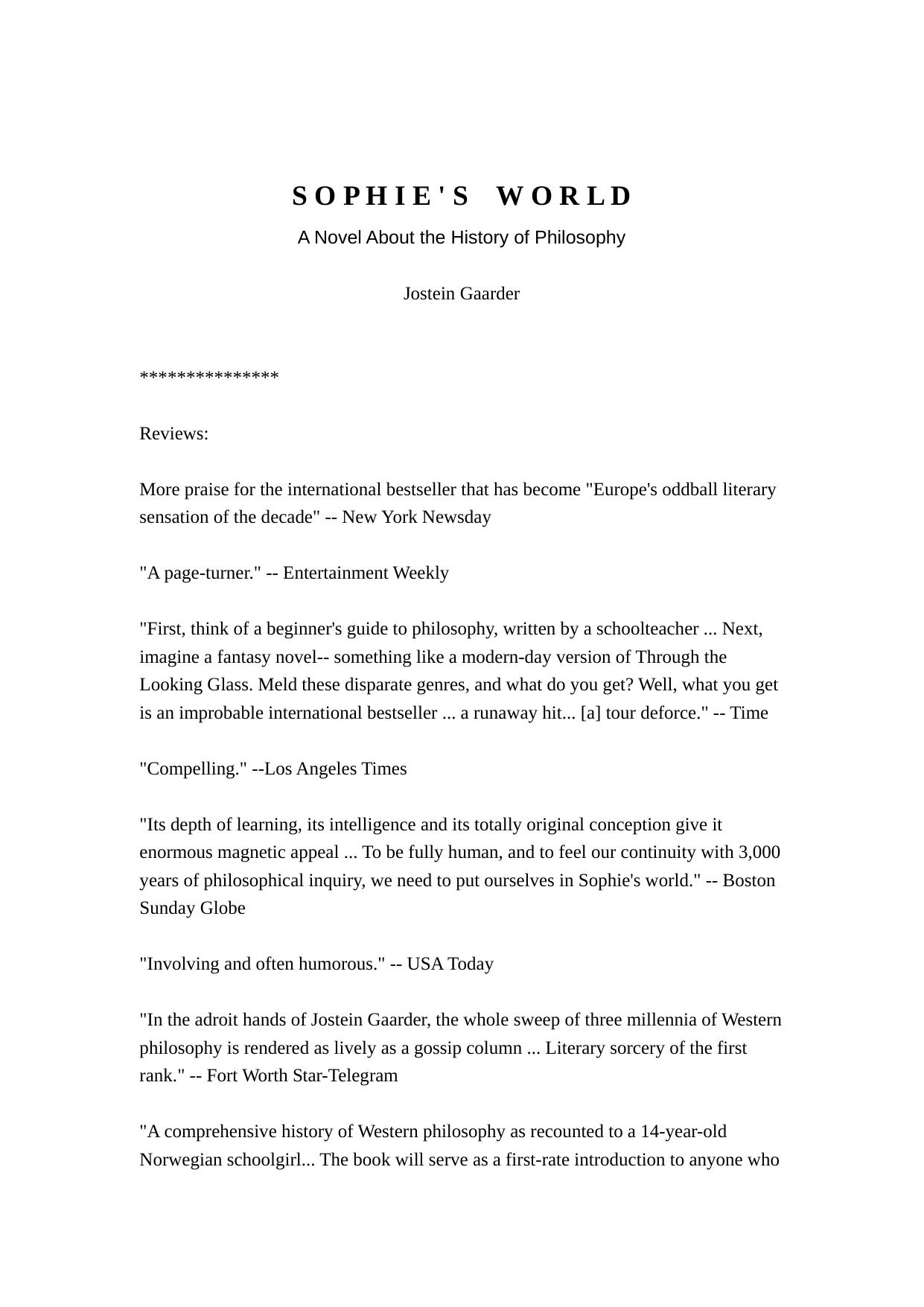Sophie's World by Jostein Gaarder

Author:Jostein Gaarder
Language: eng
Format: mobi, epub, pdf
Tags: Classics, Philosophy, Contemporary
ISBN: 0425152251
Publisher: Farrar, Straus and Giroux
Published: 1991-01-01T06:00:00+00:00
Alberto sat staring down at the table. He finally turned and looked out of the window.
“It’s clouding over,” said Sophie.
“Yes, it’s muggy.”
“Are you going to talk about Berkeley now?”
“He was the next of the three British empiricists. But as he is in a category of his own in many ways, we will first concentrate on David Hume, who lived from 1711 to 1776. He stands out as the most important of the empiricists. He is also significant as the person who set the great philosopher Immanuel Kant on the road to his philosophy.”
“Doesn’t it matter to you that I’m more interested in Berkeley’s philosophy?”
“That’s of no importance. Hume grew up near Edinburgh in Scotland. His family wanted him to take up law but he felt ‘an insurmountable resistance to everything but philosophy and learning.’ He lived in the Age of Enlightenment at the same time as great French thinkers like Voltaire and Rousseau, and he traveled widely in Europe before returning to settle down in Edinburgh toward the end of his life. His main work, A Treatise of Human Nature, was published when Hume was twenty-eight years old, but he claimed that he got the idea for the book when he was only fifteen.”
“I see I don’t have any time to waste.”
“You have already begun.”
“But if I were going to formulate my own philosophy, it would be quite different from anything I’ve heard up to now.”
“Is there anything in particular that’s missing?”
“Well, to start with, all the philosophers you have talked about are men. And men seem to live in a world of their own. I am more interested in the real world, where there are flowers and animals and children that are born and grow up. Your philosophers are always talking about ‘man’ and ‘humans,’ and now here’s another treatise on ‘human nature.’ It’s as if this ‘human’ is a middle-aged man. I mean, life begins with pregnancy and birth, and I’ve heard nothing about diapers or crying babies so far. And hardly anything about love and friendship.”
“You are right, of course. But Hume was a philosopher who thought in a different way. More than any other philosopher, he took the everyday world as his starting point. I even think Hume had a strong feeling for the way children—the new citizens of the world— experienced life.”
“I’d better listen then.”
“As an empiricist, Hume took it upon himself to clean up all the woolly concepts and thought constructions that these male philosophers had invented. There were piles of old wreckage, both written and spoken, from the Middle Ages and the rationalist philosophy of the seventeenth century. Hume proposed the return to our spontaneous experience of the world. No philosopher ‘will ever be able to take us behind the daily experiences or give us rules of conduct that are different from those we get through reflections on everyday life,’ he said.”
“Sounds promising so far. Can you give any examples?”
“In the time of Hume there was a widespread belief in angels. That is, human figures with wings.
Download
Sophie's World by Jostein Gaarder.epub
Sophie's World by Jostein Gaarder.pdf
This site does not store any files on its server. We only index and link to content provided by other sites. Please contact the content providers to delete copyright contents if any and email us, we'll remove relevant links or contents immediately.
In Control (The City Series) by Crystal Serowka(35354)
The Wolf Sea (The Oathsworn Series, Book 2) by Low Robert(33842)
We Ride Upon Sticks by Quan Barry(33276)
Crowbone (The Oathsworn Series, Book 5) by Low Robert(32320)
The Book of Dreams (Saxon Series) by Severin Tim(32231)
The Daughters of Foxcote Manor by Eve Chase(22282)
Trainspotting by Irvine Welsh(20044)
Call Me by Your Name by André Aciman(18953)
Shot Through The Heart (Supernature Book 1) by Edwin James(17923)
The Secret History by Donna Tartt(16608)
The Girl from the Opera House by Nancy Carson(14982)
Sad Girls by Lang Leav(13344)
American King (New Camelot #3) by Sierra Simone(12980)
Pimp by Iceberg Slim(12923)
All the Missing Girls by Megan Miranda(12739)
The Betrayed by Graham Heather(11689)
The Betrayed by David Hosp(11663)
4 3 2 1: A Novel by Paul Auster(11034)
Still Me by Jojo Moyes(9895)
